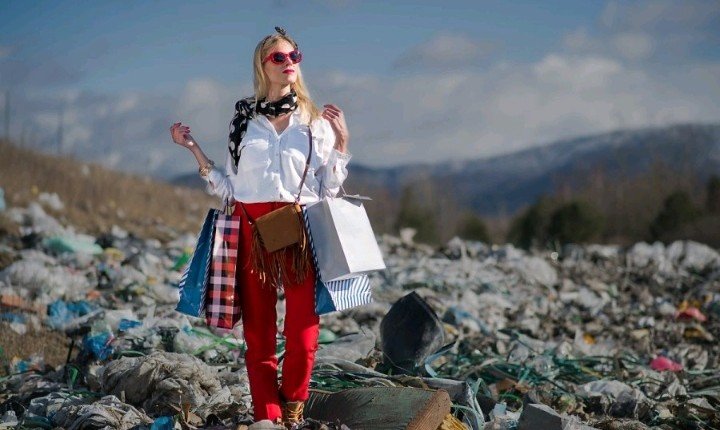Source: Africa Publicity
In the bustling city of Nairobi, Kenya, Amani worked at a local clothing store. Every day, she watched the racks fill up with new fashion trends. The store received shipments weekly, with each new arrival pushing out the old. Amani, like many of her customers, enjoyed the latest styles but began to worry about what lay behind the glossy new clothes.
Across the continent in Lagos, Nigeria, a young fashion designer named Chinedu was passionate about his craft. He had dreams of creating eco-friendly clothing that celebrated traditional African fabrics. However, Chinedu struggled to compete with the fast fashion giants who dominated the market with their cheap and rapidly changing lines.
Fast fashion, the practice of producing inexpensive clothing quickly to meet the latest trends, has become a global phenomenon. While it offers affordable and trendy clothing to consumers, its environmental impact is severe. The story of Amani and Chinedu highlights how fast fashion affects our world and why it’s crucial to address these issues.
The Environmental Toll
In Nairobi, Amani noticed a growing problem. The rapid turnover of clothing in her store meant that discarded clothes piled up in landfills at an alarming rate. The environmental impact of this waste was profound. Many of these clothes were made from synthetic materials like polyester, which takes hundreds of years to decompose. As a result, landfills overflowed with garments that contributed to soil and water pollution.
Furthermore, synthetic fibers release microplastics into the environment when washed. These tiny particles enter the water system, affecting marine life. In the Indian Ocean, just off the coast of Kenya, researchers found that microplastics from fast fashion had contaminated marine ecosystems. This pollution affected local fisheries and the health of the ocean.
In Lagos, Chinedu’s concern was not just with waste but also with the resources used in fast fashion. The production of fast fashion garments requires enormous amounts of water and energy. For instance, producing one kilogram of cotton, a common fabric in fast fashion, requires around 10,000 liters of water. Given that many parts of Africa already face water scarcity, this demand exacerbates local environmental issues.
The Impact on Local Communities
Fast fashion also affects local communities in more subtle ways. In Nairobi, the influx of cheap clothing from global brands has led to the decline of traditional textile industries. Local artisans who once thrived making handwoven garments now struggle to compete with mass-produced items. This shift has cultural implications, eroding traditional practices and crafts that have been passed down through generations.
In Lagos, Chinedu’s dream of promoting sustainable fashion faced another hurdle: the exploitation of workers. Fast fashion companies often outsource production to countries with lower labor costs, leading to poor working conditions. Workers in these factories may be exposed to harmful chemicals and work long hours for meager wages. This exploitation extends beyond economic factors, affecting the health and well-being of those involved in the production process.
Amani and Chinedu’s Response
Both Amani and Chinedu decided to take action. Amani started educating her customers about the environmental impact of fast fashion. She organized workshops in her store to promote the benefits of sustainable fashion. Amani encouraged her customers to buy less but choose higher-quality items that lasted longer. She also introduced a recycling program in her store, where customers could bring in old clothes for donation or repurposing.
Chinedu, on the other hand, focused on creating a sustainable fashion line. He sourced materials from local suppliers who used eco-friendly practices. Chinedu’s designs incorporated traditional African textiles, blending modern trends with cultural heritage. His efforts aimed not only to provide stylish clothing but also to reduce the carbon footprint associated with fashion production.
Global Efforts and Local Solutions
Amani and Chinedu’s efforts reflect a broader global movement towards more sustainable fashion practices. In Europe and North America, awareness about the negative effects of fast fashion is rising. Organizations are advocating for more transparency in the fashion industry and promoting sustainable alternatives. Brands are being encouraged to adopt circular economy practices, where clothing is designed to be reused, recycled, or composted.
In Africa, initiatives like Chinedu’s are gaining traction. Local designers and artisans are increasingly embracing sustainable practices, promoting eco-friendly materials, and supporting fair trade. There are also efforts to raise awareness about the environmental impact of fashion through community outreach and educational programs.
**Challenges and the Way Forward**
Despite these positive developments, challenges remain. The fast fashion industry’s dominance and the pressure to offer cheap clothing make it difficult to shift consumer behavior. Many people are drawn to the affordability and novelty of fast fashion, making it a tough market to disrupt.
However, change is possible. Consumers can play a crucial role by supporting sustainable fashion brands and adopting more mindful shopping habits. By choosing quality over quantity and investing in clothing that lasts, individuals can reduce their environmental impact. Additionally, supporting local artisans and designers who prioritize sustainability helps promote ethical practices in the fashion industry.
**Conclusion**
The story of Amani and Chinedu illustrates the far-reaching effects of fast fashion on the environment and local communities. From waste and pollution to cultural erosion and worker exploitation, the impact is profound. However, their actions also highlight a path forward, where sustainable practices and mindful consumption can make a difference.
As consumers and global citizens, we can contribute to this change by making informed choices and supporting those who strive for a more sustainable fashion industry. By doing so, we help preserve our environment and cultural heritage, ensuring a better future for generations to come.








